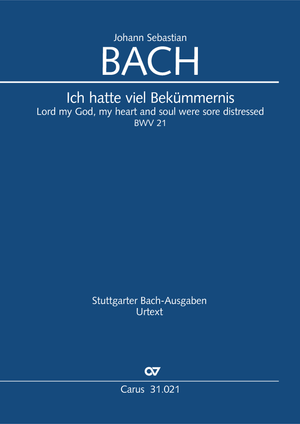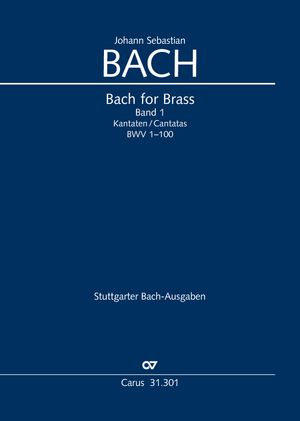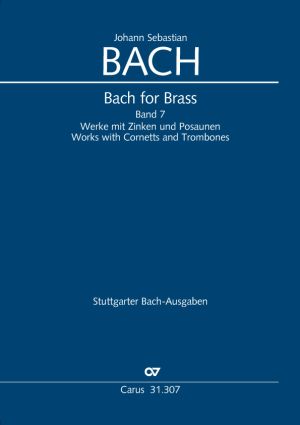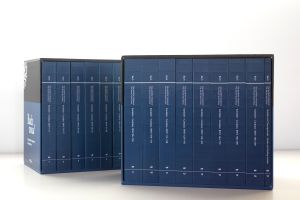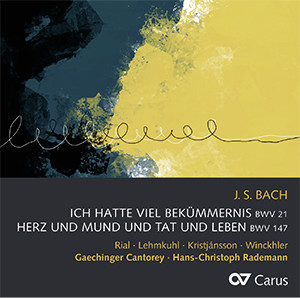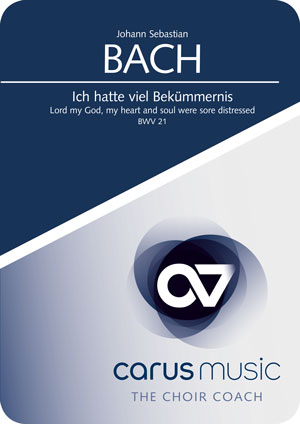
Ich hatte viel Bekümmernis
Cantate pour le 3ème dimanche après la Trinité et pour tous les jours BWV 21 (BWV3 21.1-3), 1713
La cantate Ich hatte viel Bekümmernis (J’avais grande affliction en mon cœur), BWV 21, est très prisée depuis sa publication, mais elle soulève aussi de nombreux mystères. Le conducteur est perdu, mais du matériel d’exécution avec des tonalités et des effectifs différents a été conservé. Ceux qui ne veulent pas s’emmêler dans les coloratures du chœur d’introduction et du chœur final devront bien les travailler, c’est le moment d’utiliser le mode Slow.
La Musique Chorale. Partout. A tout moment.
À la maison et en déplacement : désormais, vous aurez toujours vos œuvres chorales avec vous pour les travailler! Avec carus music, l’application pour choristes, vous pouvez écouter votre partition avec un excellent enregistrement sur votre smartphone ou tablette, et facilement travailler votre propre partie avec un coach. Avec carus music, votre préparation pour le concert est facile, efficace et agréable!
Dans cette édition de l'application, la voix sélectionnée n'est pas renforcée par le piano, mais son volume est relevé par rapport au reste de l'enregistrement, afin d'être nettement entendue.
Interprètes: Gaechinger Cantorey – Núria Rial (Soprano) – Wiebke Lehmkuhl (Alto) – Benedikt Kristjánsson (Tenore) – Matthias Wickhler (Basso) – Hans-Christoph Rademann
-
Compositeur
Johann Sebastian Bach
| 1685-1750Jean Sébastien Bach compte parmi les compositeurs essentiels de l'histoire de la musique occidentale. Il faisait partie d'une grande dynastie de musiciens, dont furent originaires nombre de musiciens municipaux et d'organistes dans les régions de Thuringe et de Saxe.
Bach vocal
Depuis la fondation des Éditions Carus en 1972, la publication des oeuvres de Johann Sebastian Bach revêt une importance particulière. En 2017, année du 500e anniversaire de la Réforme, nous avons clôturé le projet Bach vocal. L'intégralité de la musique vocale sacrée de Bach est désormais disponible en éditions modernes des textes originaux, matériel d'exécution compris. Une édition globale de toutes les partitions dans un coffret de grande qualité est aussi proposée. Plus d'information sur la personne
-
Traducteur
Henry Drinker
Questions fréquentes sur l'œuvre
 Il n'y a pas encore de questions et réponses concernant cette œuvre ou vous n'avez pas trouvé la réponse à votre question sur l'œuvre ? Cliquez ici et envoyez votre question spécifique à notre service clients.
Il n'y a pas encore de questions et réponses concernant cette œuvre ou vous n'avez pas trouvé la réponse à votre question sur l'œuvre ? Cliquez ici et envoyez votre question spécifique à notre service clients.


